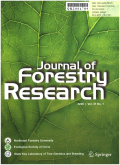- 钛学术文献服务平台 \
- 学术期刊 \
- 农业科学期刊 \
- 林业期刊 \
- 林业研究(英文版)期刊 \
Effects of 1-aminobenzotriazole on the growth and physiological characteristics of Tamarix chinensis cuttings under salt stress
Effects of 1-aminobenzotriazole on the growth and physiological characteristics of Tamarix chinensis cuttings under salt stress
基本信息来源于合作网站,原文需代理用户跳转至来源网站获取
摘要:
Vegetation restoration is a main ecological reme-diation technology for greening saline and alkaline soils. The objectives of this study were to determine the effect of 1-aminobenzotriazole (ABT-1) on the growth and physiol-ogy of Tamarix chinensis under salt stress and to determine a suitable ABT-1 concentration and soil salinity ( S c) for propagating T. chinensis- cuttings. Cuttings were soaked in water and ABT-1 solutions at three concentrations(50, 100, and 200 mg L ?1 ) and propagated in pots containing four soil salinity levels, mild (0.3%), moderate (0.6%), and severe (0.9% and 1.2%), and compared with a control. The cuttings were measured to determine growth indices and physiologi-cal and biochemical indices (e.g., chlorophyll content, super-oxide dismutase activity, peroxidase activity, and malondial-dehyde content). ABT-1 was effective in improving survival, growth, and physiological processes of cuttings under salt stress. However, there was a threshold effect when using ABT-1 to facilitate propagation under salt stress. ABT-1 effects were insignificant when applied at low concentrations (< 100 mg L ?1 ). At a high concentration (> 100 mg L ?1 ), ABT-1 limited growth and physiological activities. Under a salt stress level ( S c ≤ 0.9%), ABT applied at a 100 mg L ?1 concentration increased chlorophyll content and superox-ide dismutase and peroxidase activities in the leaves and reduced malondialdehyde accumulation and membrane lipid peroxidation effects. As a result, ABT-1 enhanced the resist-ance of T. chinensis to salt stress. However, under high salt stress (> 0.9%) and ABT-1 concentration (> 100 mg L ?1 ), the physiological regulatory ability of T. chinensis seedlings weakened. T. chinensis grew well at a salt stress ≤ 0.9% and ABT ≤ 100 mg L ?1 and exhibited relatively high physiologi-cal regulatory ability and high salt adaptability.

推荐文章
Effects of a proline solution cover on the geochemical and mineralogical characteristics of high-sul
Proline
Coal gangue
Pollution control
Heavy metal fraction
Mineralogical characteristics
Effects of drip irrigation modes on growth and physiological characteristics of Arabica coffee under
Characteristics of heavy metals in soils under different land use in a typical karst area, Southwest
Heavy metals
Soil organic carbon
Land use
Karst
Southwest China
Effects of organic mineral fertiliser on heavy metal migration and potential carbon sink in soils in
Karst
Soil pollution
Cd
Organic mineral fertilisers
Carbon sink
内容分析
关键词云
关键词热度
相关文献总数
(/次)
(/年)
引文网络
引文网络
二级参考文献 (199)
共引文献 (396)
参考文献 (21)
节点文献
引证文献 (0)
同被引文献 (0)
二级引证文献 (0)
1964(1)
- 参考文献(0)
- 二级参考文献(1)
1984(1)
- 参考文献(0)
- 二级参考文献(1)
1987(1)
- 参考文献(0)
- 二级参考文献(1)
1991(6)
- 参考文献(0)
- 二级参考文献(6)
1992(3)
- 参考文献(0)
- 二级参考文献(3)
1994(1)
- 参考文献(0)
- 二级参考文献(1)
1995(3)
- 参考文献(0)
- 二级参考文献(3)
1996(2)
- 参考文献(0)
- 二级参考文献(2)
1997(3)
- 参考文献(0)
- 二级参考文献(3)
1998(4)
- 参考文献(0)
- 二级参考文献(4)
1999(7)
- 参考文献(0)
- 二级参考文献(7)
2000(6)
- 参考文献(1)
- 二级参考文献(5)
2001(4)
- 参考文献(0)
- 二级参考文献(4)
2002(11)
- 参考文献(1)
- 二级参考文献(10)
2003(8)
- 参考文献(0)
- 二级参考文献(8)
2004(10)
- 参考文献(0)
- 二级参考文献(10)
2005(8)
- 参考文献(2)
- 二级参考文献(6)
2006(7)
- 参考文献(1)
- 二级参考文献(6)
2007(8)
- 参考文献(0)
- 二级参考文献(8)
2008(17)
- 参考文献(1)
- 二级参考文献(16)
2009(16)
- 参考文献(2)
- 二级参考文献(14)
2010(38)
- 参考文献(0)
- 二级参考文献(38)
2011(14)
- 参考文献(1)
- 二级参考文献(13)
2012(6)
- 参考文献(3)
- 二级参考文献(3)
2013(5)
- 参考文献(1)
- 二级参考文献(4)
2014(8)
- 参考文献(1)
- 二级参考文献(7)
2015(3)
- 参考文献(0)
- 二级参考文献(3)
2016(6)
- 参考文献(2)
- 二级参考文献(4)
2017(7)
- 参考文献(2)
- 二级参考文献(5)
2018(4)
- 参考文献(1)
- 二级参考文献(3)
2019(2)
- 参考文献(2)
- 二级参考文献(0)
2021(0)
- 参考文献(0)
- 二级参考文献(0)
- 引证文献(0)
- 二级引证文献(0)
引文网络交叉学科
相关学者/机构
期刊影响力
林业研究(英文版)
主办单位:
东北林业大学
中国生态学学会
出版周期:
双月刊
ISSN:
1007-662X
CN:
23-1409/S
开本:
大16开
出版地:
哈尔滨市动力区和兴路26号(林大123信箱)
邮发代号:
创刊时间:
1990
语种:
eng
出版文献量(篇)
2459
总下载数(次)
1
总被引数(次)
7852
期刊文献
相关文献
推荐文献
- 期刊分类
- 期刊(年)
- 期刊(期)
- 期刊推荐
林业研究(英文版)2022
林业研究(英文版)2021
林业研究(英文版)2020
林业研究(英文版)2019
林业研究(英文版)2018
林业研究(英文版)2017
林业研究(英文版)2016
林业研究(英文版)2015
林业研究(英文版)2014
林业研究(英文版)2013
林业研究(英文版)2012
林业研究(英文版)2011
林业研究(英文版)2010
林业研究(英文版)2009
林业研究(英文版)2008
林业研究(英文版)2007
林业研究(英文版)2006
林业研究(英文版)2005
林业研究(英文版)2004
林业研究(英文版)2003
林业研究(英文版)2002
林业研究(英文版)2001
林业研究(英文版)2000
林业研究(英文版)1999

 免费查重
免费查重










